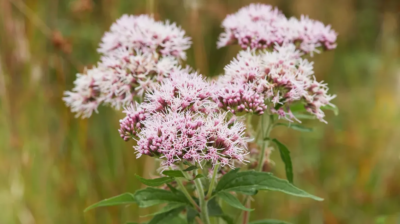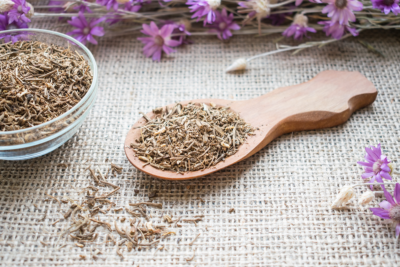
You may want to reach for this month’s featured bulk herb of the month, valerian, as the busy season ramps up.
Botanical Description
Valerian (Valeriana officinalis) is a perennial plant native to Asia and Europe that has been used medicinally since ancient Greek and Roman times. It’s a member of the Caprifoliaceae (honeysuckle) family that grows in meadows and woodlands within moist, temperate climates. It now grows in many parts of the world, including the United States. The plant’s clusters of small white or pink flowers have a pleasant smell, unlike its rhizomatous root system, which has a strong odor that many people find unpleasant. These roots are harvested and dried and commonly used to treat insomnia and anxiety.

Medicinal Uses of Valerian
Scientists are still unsure of how exactly valerian works in the body, but they suspect certain compounds in the plant may increase the levels of GABA (gamma aminobutyric acid) in the brain, a chemical messenger that helps regulate nerve cells. GABA is one of the main neurotransmitters responsible for sleep regulation, and increasing the amount of GABA available in the body has calming effects on anxiety. Drugs such as Xanax and Valium also serve a similar function, giving valerian the nickname “nature’s Valium.” This herb can be used as an alternative to prescription medications for sleep troubles because it is generally considered to be safe and gentle and may have fewer side effects.
Compounds in valerian may also interact with receptors for serotonin and adenosine, chemicals that affect the regulation of sleep and mood. Some studies have shown that valerian root may help people fall asleep faster and improve the quality and quantity of their sleep.
Fun fact: Cats are highly attracted to the scent of valerian roots in the same way they are attracted to catnip.
 How to Use Valerian Root
How to Use Valerian Root
You can find dried valerian root in our bulk herbs department. It can be powdered, encapsulated, tinctured, or infused into herbal tea blends. It is often combined with other sedative herbs, such as hops, skullcap, passionflower, chamomile, and lemon balm, to mask its generally unpleasant odor.
Precautions
Some people may experience paradoxical side effects from valerian, such as anxiousness or restlessness. Valerian may also slow down how quickly certain drugs are broken down by the liver, so if you’re currently taking any other medications, be sure to consult with your health care provider before taking valerian.
